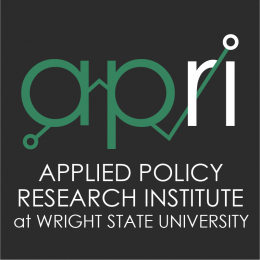 A Wright State University research organization that for the past 30 years has helped local governments and nonprofits analyze data, measure economic impact and find solutions has a new name, a more diversified research portfolio and an expanded mission.
A Wright State University research organization that for the past 30 years has helped local governments and nonprofits analyze data, measure economic impact and find solutions has a new name, a more diversified research portfolio and an expanded mission.
The Applied Policy Research Institute (APRI), which began as the Center for Urban and Public Affairs, announced its new brand Feb. 29 to mark growth in the organization’s trajectory and portfolio.
“Our new name reflects who we are and where we’re going,” said APRI Director Michael Wiehe. “For the last three decades, we’ve been a ‘hidden gem’ in the community serving the needs of local governments and nonprofits. We will continue to serve those clients, but we’re also shifting to become an engaged regional thought leader. The intellectual capabilities on staff at APRI and throughout Wright State’s faculty are powerful, and we’re here to serve legislators and other decision-makers through data-driven analysis to improve programs and policies for the benefit of the public.”
Along with APRI’s new name and look is a refreshed web presence.
“We simply want to allow community stakeholders better access to our research. We want them to see our products and experience our range of expertise,” said APRI’s Communications Strategist Sarah Ammar. “We have an incredible staff and an extended and deep knowledge base with the faculty. Our new web presence will enable decision-makers and the community to more easily tap into our expertise.”
The home for that new web presence is wright.edu/apri.
Research and capabilities
As APRI, the institute will explore a variety of policy areas, with special focus on defense, government services, economic development, education, community development, workforce development and public health.
The institute is already hard at work on some major projects with policy and economic development implications. For example, it has engaged with several community partners to execute a grant from the U.S. Department of Defense’s Office of Economic Adjustment. The project seeks to diversify the region’s economy and enhance the entrepreneurial/small business environment.
“We’re working on a resource that entrepreneurs, funders and others can tap into and that will allow them to easily connect and collaborate seamlessly with one another,” Wiehe said. “And we’re developing that resource through quantitative data as well as qualitative interviews and focus groups with entrepreneurs and investors.”
In addition to policy issue focus areas, APRI’s staff has a proven track record in data analytics, program evaluation, economic impact analysis, geospatial analysis, consensus building and data collection.
The staff includes subject matter experts, data analysts and researchers, as well as former Capitol Hill staffers. Wiehe himself spent over a decade working as legislative adviser to Congressman Mike Turner.
APRI also boasts a quick turn-around polling capability, the Wright Poll. The institute has conducted surveys for very specific needs of clients for decades, and now it is expanding that capability to include broader issue polling.
“If there’s a question about a policy topic like drug legalization or major workforce issues, we have the capability to run polls and gauge public opinion,” Wiehe said.
Engaging faculty
Part of the new trajectory of APRI, which is housed in Wright State’s College of Liberal Arts, is actively involving other experts throughout the university’s campus.
“Our staff is well-respected in data analysis circles throughout the state and in even in the D.C. think tank community,” said Wiehe, referring in part to APRI’s Associate Director Jane Dockery’s involvement in the Brookings Institution’s Restoring Prosperity research series. “But we also have an intellectual powerhouse among the faculty here. We’ll be doing more work to connect university research that has policy implications directly to those making policy decisions.”
Applied policy experience for students
Another new component to APRI is a focus on building the pipeline of students to government leadership positions. APRI staff is working with university partners such as the Center for Liberal Arts Student Success to place interested students in internships with government offices at the local, state and federal level.
“As part of an academic institution like Wright State, we also want to do our part in preparing students for tomorrow’s challenges. We want to help students obtain real-world policy experience while pursuing their education,” Wiehe said.
‘Here to help’
“Most importantly, we want people to know we’re here to help them tackle and understand challenges,” he said. “Our access to datasets on multiple topics and capability to collect and analyze additional data can help explain the challenge and identify potential solutions. We’re here to provide the data that will allow for more informed decisions, programming and policymaking.”


 Wright State alum Lindsay Aitchison fulfills childhood space-agency dream
Wright State alum Lindsay Aitchison fulfills childhood space-agency dream  Wright State business professor, alumnus honored by regional technology organizations
Wright State business professor, alumnus honored by regional technology organizations  Wright State University Foundation awards 11 Students First Fund projects
Wright State University Foundation awards 11 Students First Fund projects  Gov. DeWine reappoints Board Treasurer Beth Ferris and names student Ella Vaught to Wright State Board of Trustees
Gov. DeWine reappoints Board Treasurer Beth Ferris and names student Ella Vaught to Wright State Board of Trustees  Joe Gruenberg’s 40-Year support for Wright State celebrated with Honorary Alumnus Award
Joe Gruenberg’s 40-Year support for Wright State celebrated with Honorary Alumnus Award 